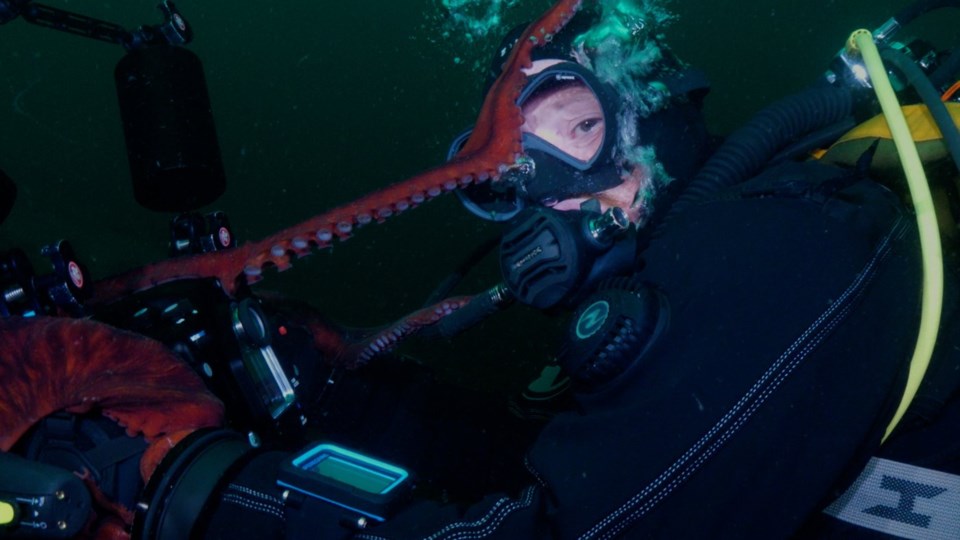When it comes to cinematography, a giant Pacific octopus that borrowed a camera from two divers earns a solid "10 out of 10."
Underwater videographer John Roney said he and his longtime diving buddy Chris Mullen went out on Aug. 5 to Nanoose Bay on the east side of Vancouver Island, a renowned spot for large octopus.
Roney said they came across several, but one "particularly large" octopus — as large as three metres wide, arm to arm — caught their attention.
It was resting under a ledge, but immediately showed interest in them after they passed by, he said.
"It sort of approached us directly, hopped, and explored my camera, and then I just let go of my camera and I let it have it for a couple of minutes," said Roney.
The resulting video was a mesmerizing display of the creature's pink underbelly, its sucker-covered arms fanned out like an umbrella over the camera.
"It was carrying the camera around for a little bit, aiming it at a wall and stuff. It was doing some filming on its own," laughed Roney, "It was even kind enough to use its suckers to turn it off after (the camera) was running for about three minutes."
Roney, a Vancouver Island-based underwater videographer who has been working as a documentary filmmaker for many years, said the animal's camera work was excellent.
"Ten out of 10 underwater videographer for the octopus," Roney said "Honestly, the best footage of inside an octopus' web I've seen an octopus take."
"Better than me by far," Mullen quipped.
Roney later posted the video online, giving the octopus a credit.
The footage has received thousands of likes and comments.
After the animal was done with the camera, it jumped onto Mullen with its arms around him and suckers on his mask.
Roney said he was able to capture the "hug."
Rather than being aggressive, the octopus appeared curious, using its suckers to explore its environment, Roney said.
"And so you could see it was holding on to him, but it wasn't grabbing him," said Roney, "Chris looked like he was having a good time."
"It was a very gentle hug," recalled Mullen about the close encounter, "This is what I was hoping for, this was what I wanted."
Roney said he has done about 1,500 dives over the years, but has only had two close interactions with an octopus.
Giant Pacific octopuses are fascinating, interactive animals, and every single time he encounters one, he can't get enough of them, Roney said.
Victoria-born marine biologist Jennifer Mather has watched the video, and said the octopus wasn't deliberately taking a selfie even though its work was beautiful.
Mather, an octopus expert with the University of Lethbridge in Alberta, said when an octopus finds something interesting and potentially edible, it will pick it up and put it underneath the arm web, which is exactly what we see in the video.
"And the person who had the camera, of course, got pictures because the camera was still running. But it doesn't have anything to do with the octopus taking selfies. Sorry," said Mather.
Mather said the animals are very smart in other ways, likening their personalities to cats.
In most situations, when they see divers who crowd around them, they'll sneak away or hide, but an underwater camera with shiny, fresh lights could be quite interesting to them, making them wonder what they can do with it.
"Because octopuses do play — not social play, but object play," said Mather.
Roney said the community response to the video has been incredible.
"You really see that people are fascinated by these animals because they're so intelligent and they're so curious, and they're also so otherworldly, right. They're so different from anything that you'd see on land," he said.
"And it makes me happy to see people seeing our local marine life here."
This report by The Canadian Press was first published Aug. 9, 2025.
Nono Shen, The Canadian Press



